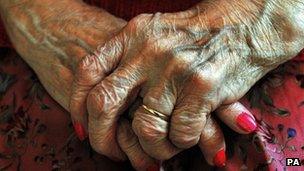NHS ageism 'harming elderly care'
- Published

The report calls for better training in the treatment of elderly people
The elderly are being passed around hospitals in England like parcels, often going without treatment because of ageist attitudes, a report suggests.
The King's Fund review said treatable conditions such as incontinence and depression were sometimes ignored.
And even diseases like cancer and heart disease were not always tested for, it suggested.
A Department of Health spokesman said addressing problems with elderly care was a key priority for the NHS.
He added the reforms being introduced in the health service were designed to free staff from the obstacles they were facing to putting patients first.
The report - based on patient surveys and evidence from staff - is the latest in a series of critical reports on elderly care.
The Patients Association and Care Quality Commission have both recently published studies detailing "shocking" standards.
The problem has prompted the Royal College of Nursing to call for minimum staffing levels for elderly care.
'Bed blocker'
This study by the King's Fund criticised the whole approach to elderly care, saying the attitudes and language used suggested staff - particularly doctors - were ageist.
It highlighted the uses of phrases such as "bed blocker" as well as the fact the elderly did not always receive the same assessments and treatments as younger patients.
But the think tank also laid the blame on the system, pointing out the volumes of work and pressure on meeting targets was compromising care.
It said elderly patients, who make up two-thirds of admissions, often found themselves on the wrong wards and passed around "like parcels" because of the rush to admit them.
The King's Fund called for better training for staff, leadership and involvement of patients to ensure the co-ordination of care improved.
Report author Jocelyn Cornwell said: "The health and social care system system has failed to keep pace with changing health needs.
"It needs a radical rethink from top to bottom."
Michelle Mitchell, from Age UK, added: "Health services cannot deliver high-quality services unless older people are treated as individuals and their care is co-ordinated.
"This is what a modern health service needs to deliver."
- Published20 March 2012
- Published29 February 2012
- Published29 February 2012
- Published9 November 2011
- Published13 October 2011
- Published13 October 2011
- Published22 September 2011